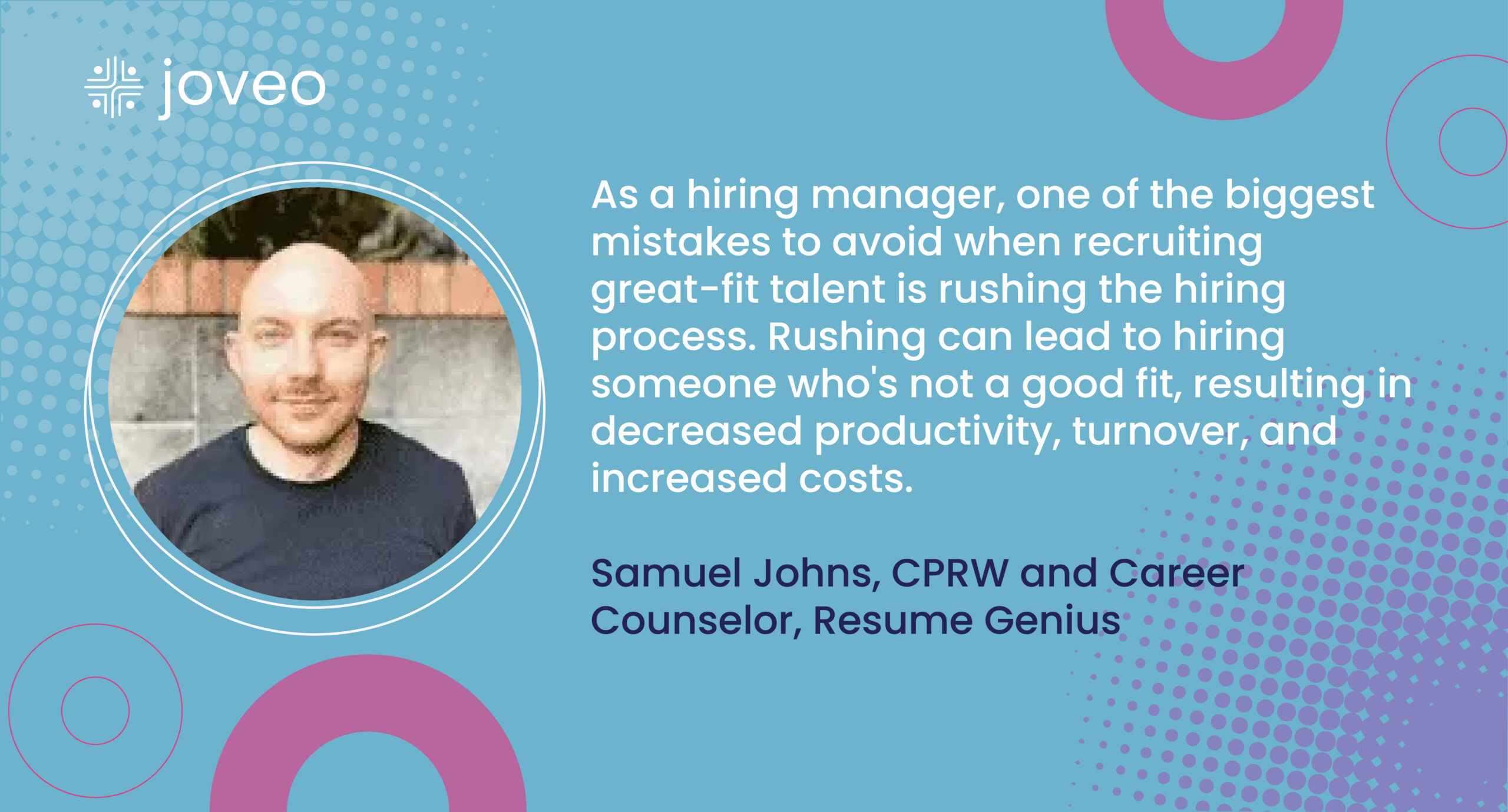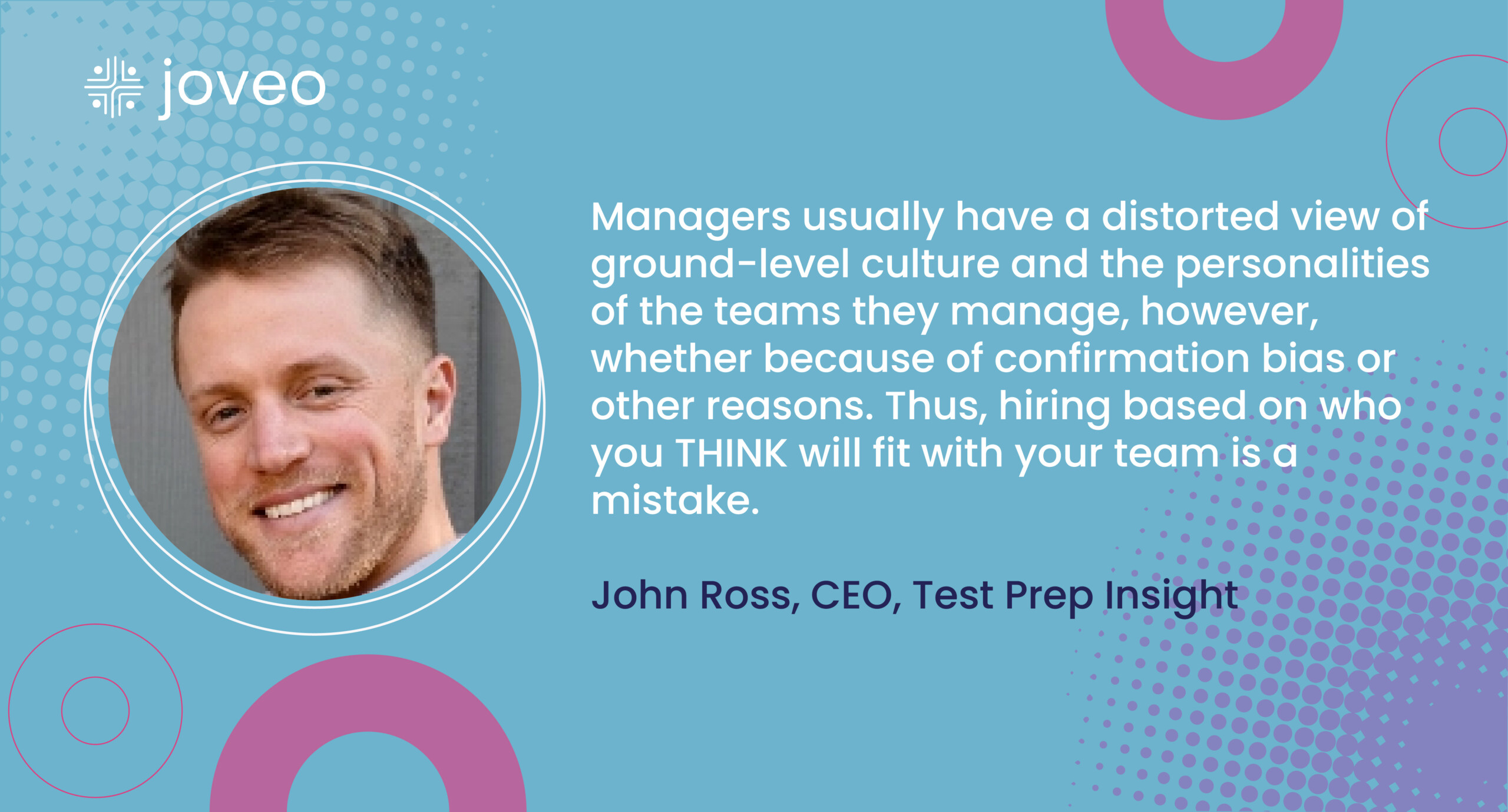Not Tapping into Passive Job Seekers
Many great-fit job candidates are already employed, and may not be actively looking for a new opportunity. That doesn’t mean they might not be open to hearing about viable opportunities elsewhere.
With recruiters spending most of their time on active job seekers, it’s important to make sure you’re also focusing your efforts on the passive job pool. You never know who might be the perfect fit for your organization. LinkedIn can be a great resource for tapping into passive job seekers, but don’t forget about other channels such as alumni networks, industry conferences, and professional associations.
By taking the time to build relationships with passive job seekers long before you may need them, you’ll find it easier to fill your recruitment pipeline with great-fit talent when the need arises.
Darren Shafae, Founder, ResumeBlaze

Being Unclear About Expectations
Not getting on the same page from day one is one of the biggest mistakes talent acquisition teams can make. You may find a great-fit candidate, but you can just as easily lose them if you’re vague or uninformative during the interview process.
This can cause confusion later on, which can cause a candidate to change their mind or build resentment towards your company, neither of which is a good start in your working relationship. Always, always be clear about your expectations and offerings from the outset.
John Berry, CEO and Managing Partner, Berry Law
Not Keeping an Open Mind
Sometimes TA teams focus so much on finding the perfect fit with specific experience and qualifications that they automatically disregard talented professionals. This could mean not being open to individuals outside of an industry who could bring a different perspective to the company.
Unless the role is extremely specialized, it’s a mistake not to open the doors to some creative leaders that could become powerful assets to an organization.
Kelli Anderson, Career Coach, Resume Seed
Rushing the Process
As a hiring manager, one of the biggest mistakes to avoid when recruiting great-fit talent is rushing the hiring process. Taking the time to thoroughly evaluate candidates ensures that they possess the required skills, experience, and cultural fit for the role. Rushing can lead to hiring someone who’s not a good fit, resulting in decreased productivity, turnover, and increased costs. This also allows the candidate to take the time to evaluate us to determine if the company’s a great fit for them.
Personally, I like to assess soft skills, such as communication, teamwork, and problem-solving abilities and have candidates meet their potential team to get an idea of our work style and on-site environment.
To thoroughly evaluate candidates, employers should use a variety of assessment methods like behavioral interviews, personality tests, and social media screening to evaluate candidates holistically and ensure that they’re the right fit for the company.
Samuel Johns, CPRW and Career Counselor, Resume Genius

Asking Predictable Interview Questions
Are you looking for a great fit for your organization? Don’t set predictable questions that candidates can easily mug up and answer. This is the biggest mistake that employers make while hiring thus they could not find the best fit for the vacant position. In the era of the internet, preparing for the obvious question is easy.
Candidates can easily fake their personality or hide it to get the job. It happens when they know which questions are going to be asked in the interview. Being an employer you should set some behavioral questions and situation-based questions. But many of these types of questions have also become common and most candidates know them.
So, according to me, analyze the job requirement of your organization and then set some citation-based questions. Most probably candidates would have no idea about such questions. This way, you can avoid making mistakes in hiring and find the best fit for the particular job.
Saikat Ghosh, Associate Director of HR & Business, Technource
Assuming You Know Your Team’s Culture
When recruiting for a great-fit talent, one of the biggest mistakes managers make is assuming they understand their team’s culture. They believe that since they are the leader of their team, everyone beneath them thinks and acts like them.
Managers usually have a distorted view of ground-level culture and the personalities of the teams they manage, however, whether because of confirmation bias or other reasons. Thus, hiring based on who you THINK will fit with your team is a mistake. Managers need to involve direct reports, especially team leads, in such decisions to ensure a great fit.
John Ross, CEO, Test Prep Insight

Overlooking Candidates With Fewer Qualifications
Candidates with less experience or qualifications may be more open-minded, adaptable, and eager to learn in some cases, making them excellent additions to your team.
To avoid making this mistake, consider the candidate’s potential, attitude, cultural fit, qualifications, and experience. Candidates with a strong work ethic, a willingness to learn and take on new challenges, and a positive attitude are ideal.
Also, consider offering training and mentorship opportunities to new hires to help them develop the skills they need to succeed in their roles. You can help your employees reach their full potential and contribute to the success of your business by investing in their growth and development.
Johannes Larsson, Founder and CEO, JohannesLarsson.com
Not Providing Adequate Training and Onboarding
If you want to ensure your new hire’s success, then you need to provide them with the training and onboarding they need once they are employed. If you don’t, you risk your employees becoming disengaged at work and losing interest in their jobs.
Having a defined career path is a great way to foster a positive work environment and retain talented employees who are a good fit for the organization.
Kyle Bassett, Chief Operating Officer, Altitude Control
Not Taking Time to Build a Deep Understanding of the Role
Understanding the specific skill sets and qualities needed to do the job well will help recruiters identify candidates who may not be exact matches on paper but still have what it takes to thrive in the role.
Having this level of insight also helps recruiters know when to look beyond existing resources and tap into new talent pools. Knowing exactly what type of person would be a great fit for the role allows recruiters to find true top-performing talent while avoiding time-consuming (and costly) misfires.
Mariusz Michalowski, Community and Career Expert, Spacelift
Ignoring Cultural Fit
Building a cohesive and productive team requires cultural fit. In my opinion, overlooking cultural fit could cause the hiring of a candidate who has the qualifications but does not fit with the corporate culture. To avoid this mistake, recruiters may consider including cultural fit tests in the interview process and allowing candidates to learn about the company’s culture and values.
Frederic Linfjärd, Director of Growth Marketing, Planday
Using Unstructured, Informal Interviews
Research reveals that structured interviews, which use a fixed set of questions, predict performance far more strongly than unstructured interviews.
Informal interviews may feel more natural, but they introduce significant unreliability into the process. Some candidates are given an easy time, receiving more favorable questions or greater leeway regarding probing questions, while others are given harder questions and fewer opportunities to explore probing questions.
Not only does this reduce the reliability of selection decisions, but it also introduces a significant bias in the process. We invariably introduce an unconscious bias against particular demographics, increasing the probability of adverse impact.
Structured interviews, however, keep the questions consistent between candidates, ensuring a fair comparison. This also limits the impact of unconscious bias, preventing interviewers from unfairly advantaging or disadvantaging candidates based on their background.
Ben Schwencke, Business Psychologist, Test Partnership

Source Smarter. Hire Faster. Spend Less. Let’s talk about how Joveo can help you up your talent acquisition game and find those great-fit candidates. And follow us on Twitter and LinkedIn, where we’re always working to help you get the most out of your recruitment advertising.














